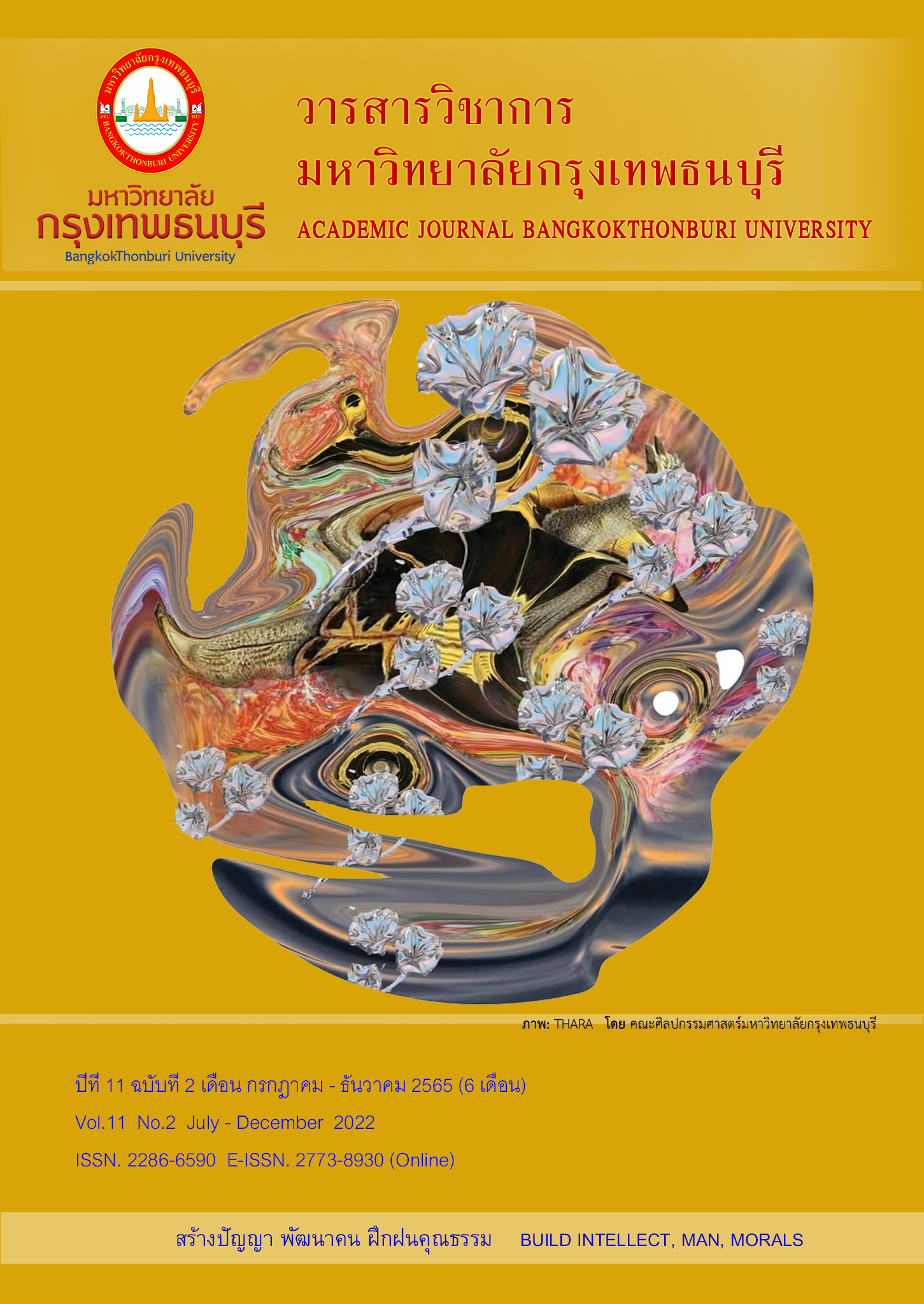Authentic Assessment Model on Cooperative Education
Main Article Content
Abstract
The objective of this research is to develop an authentic assessment Model for Cooperative Education (Co-op) and test it with Co-op students. The sample was divided into three groups: (1) a sample of 80 undergraduate Co-operative students, (2) a sample of 40 Co-op job supervisors of these student. and (3) a sample of 2 Co-op advisors of these student. The questionnaires/assessments and structured interviews were used as the data collection tools. Frequency, percentage, average, standard deviation, and
T-Test were used to analyze the data. The research results are
1) The developed Co-op authentic assessment model on cooperative education includes: the five times of authentic self-assessment based on the actual conditions of the students, and the four times of portfolios assessment by the supervisors and advisors.
2) The Co-op authentic assessment model encourages Co-op students' growth in intellectual, interpersonal, and responsible skills in general, with statistical significance at the level .05.
3) According to Co-op students, Co-op job supervisors, and Co-op advisers, the Co-op authentic assessment paradigm promotes high-level learning for Co-op students. This evaluation helps Co-op students understand their ability levels and how to improve their performance. The portfolio encourages Co-op students to remember their daily tasks and to excel at more demanding tasks. The Co-op job supervisor and advisers gain a comprehensive understanding of the opinions of Co-op students and can provide them with assistance throughout the co-op work term.
Article Details

This work is licensed under a Creative Commons Attribution-NonCommercial-NoDerivatives 4.0 International License.
References
จิตราพร ลีละวัฒน์. (2552). การบริหารจัดการตนเองของนักศึกษาในการปฏิบัติงานสหกิจศึกษา: กรณีศึกษามหาวิทยาลัยศรีปทุม. วารสารสหกิจศึกษาไทย, 1(1), 69-74.
พรชัย มงคลวนิช. (2552). ปัจจัยที่ส่งเสริมและฉุดรั้งความสำเร็จในการจัดการศึกษาแบบสหกิจศึกษาในสถาบันอุดมศึกษาไทย. วารสารสหกิจศึกษาไทย, 1(1), 19-38.
มินท์. (2548). เรื่องพัฒนาซอฟต์แวร์มีแค่นี้. แปลโดย สมชาย กิตติชัยกุลกิจ. กรุงเทพฯ: สมาคมส่งเสริมเทคโนโลยี (ไทย-ญี่ปุ่น).
วีรวรรณ จันทนะทรัพย์, ภภัสสร สิงหธรรม, นิภาพร ปัญญา และนริศรา นาคเมธี. (2554). การประเมินผลสัมฤทธิ์ โครงการสหกิจศึกษาคณะวิทยาศาสตร์และเทคโนโลยี รุ่นที่ 1. กรุงเทพฯ: มหาวิทยาลัยเทคโนโลยีราชมงคลพระนคร.
สมหวัง พิธิยานุวัฒน์. (2551). วิธีวิทยาการประเมิน: ศาสตร์แห่งคุณค่า. กรุงเทพฯ: สำนักพิมพ์แห่งจุฬาลงกรณ์มหาวิทยาลัย.
สมาคมสหกิจศึกษาไทย. (2555). คู่มือการจัดสหกิจศึกษา. กรุงเทพฯ: พริ้นท์ ซิตี้.
สุขุมาล เกิดนอก, นพพล ตั้งสุภาชัย และ จอมภัค จันทะคัต. (2552). ความพึงพอใจขององค์กรผู้ใช้บัณฑิตต่อบัณฑิตหลักสูตรสหกิจศึกษาเปรียบเทียบกับบัณฑิตหลักสูตรทั่วไปในเขตจังหวัดนครราชสีมาและพื้นที่อีสานใต้ (จังหวัดชัยภูมิ จังหวัดบุรีรัมย์ และจังหวัดสุรินทร์). กรุงเทพฯ: สำนักคณะกรรมการการอุดมศึกษา.
สุเมธ แย้มนุ่น. (2560). การประเมินผลสหกิจศึกษา. กรุงเทพฯ: สมาคมสหกิจศึกษาไทย.
Carroll, D. (2013). Business student’s attitudes to criteria based self-assessment and self-efficacy. In H. Carter, M. Gosper & J. Hedberg (Eds.), Electric Dreams. Proceedings Ascilite 2013 Sydney.
Jaekel, A., Hector, S., Northwood, D., Benzinger, K., Salinitri, G., Johrendt, J. & Watters, M. (2011). Development of Learning Outcomes Assessment Methods for Co-operative Education Programs. Canada: University of Winsor.
Johrendt, J., Singh, P., Hector, S., Watters, M., Salinitri, G., Benzinger, K., Jaekel A. & Northwood, D. (2009). The Co-Op Portfolio: An Essential Tool for Assessment and Student Development in Co-operative Engineering Programs. In The 20th Australasian Association for Engineering Education Conference. Australia: University of Adelaide.
Burrus, J., Jackson, T., Xi, N., & Steinberg, J. (2013). Identifying the most important 21st century workforce competencies: An analysis of the occupational information network.


